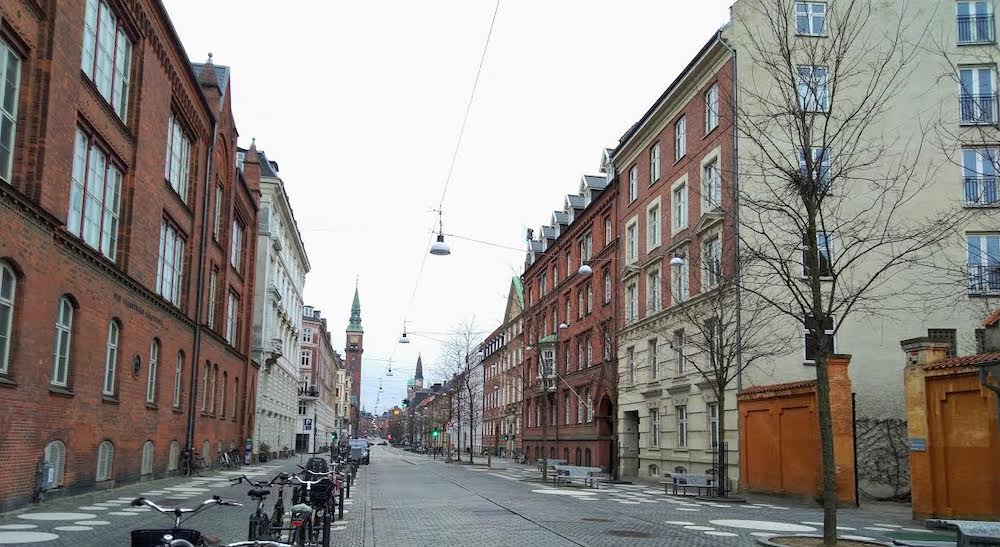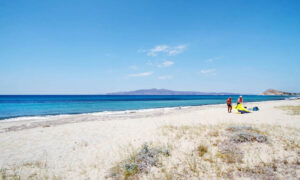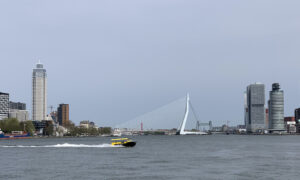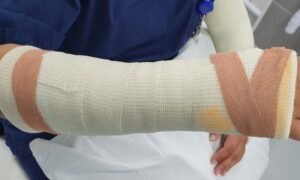(Editor’s note: See Pt. 1 of Letícia’s post here about her ill-fated trip to Copenhagen at the beginning of the pandemic.)
Now it occurred to me that it really started to get weird the day before our flight: I went downtown in Eindhoven to buy some things for the trip and tried to find a hand sanitizer to carry in my purse, just in case. Nope. Nothing. Zero. I got some moist wipes, but there was a quota of only two packages per person.
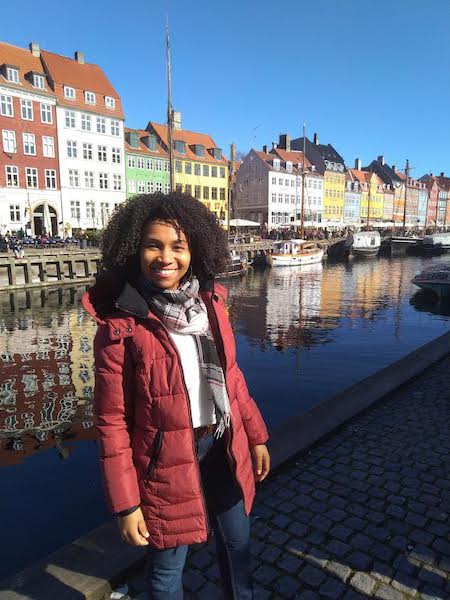
Yes: rationing.
Eindhoven Airport is usually not a busy place. But on that Friday morning, it was especially empty. There were several people wearing masks, some even with disposable gloves. My husband was super calm, but I was already getting a little nervous. When we boarded the plane, my eye caught one of the flight attendants biting her nails. And then touching the seats. Putting the hand in her mouth again … it made me realize how people do not pay attention in general.
We are operating on autopilot. And that could be contributing to so many people getting sick.
We arrived at the hotel in Copenhagen, completed the check-in process, and went out to have something to eat. We found a McDonald’s two blocks away. There we saw several signs saying, “Please don’t use this table.” We concluded that it was because of the virus: this way, people would not sit next to each other.
I woke up the next morning with a message from one of my best friends: “Where are you guys? I just read that the Danish government ordered the closure of all borders.” “Well, we were probably the last ones to come in,” I replied, laughing, and not necessarily because I was finding it amusing ….
We went down to the lobby to find that the walking tour promoted by the hotel had been canceled. They suggested that we tried the one that departs from the city center. Lucky us (?), we took the last tour in at least a month, according to the guide, accompanied by about 10 people only.
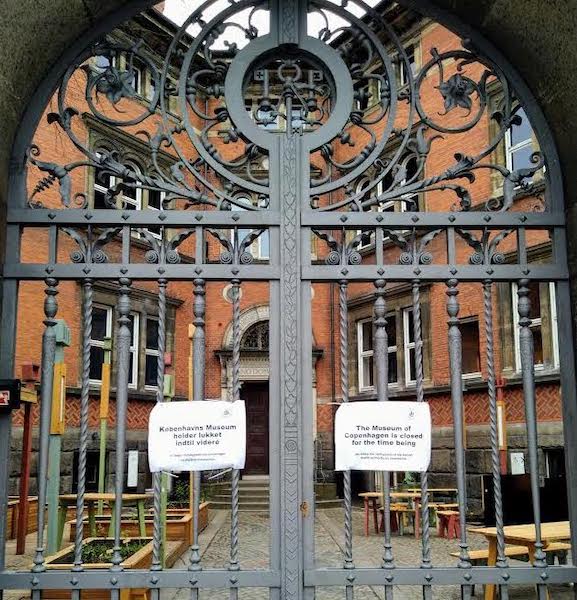
The day was stunning: the sky was so blue people could not believe it. We took beautiful pictures and even found a restaurant open for dinner.
Think of Saturday night at a restaurant in the city center: there was the waiter, the chef, my husband and me – no one else.
They explained that they were allowed to be open because it was a small place. Their largest location, for more than 100 people, had to be shut down, as were all the other bars, museums, theaters, churches and so on. That was the moment when I realized that the economy would undergo some difficult times with all this. My mind started to trip on so many people around the world, quite possibly, losing their jobs, and I kept thinking about where it all will end.
FLIGHT CANCELLED
Our plan for Sunday was to take a long walk across the city and see the famous Little Mermaid. Right after breakfast, I looked at my husband, who was holding his mobile phone, and he was looking tense: our flight back had been canceled. Not rescheduled: canceled.
No flights from that company would leave Denmark from March 16, the day we would return. After a few seconds of complete panic (as a couple we know had already said they were stuck in the Canary Islands), we managed to buy last minute tickets for Sunday evening.
Our biggest fear was that there would be no more tickets available due to the demand of all tourists in a similar situation.
At this point, money was definitely no longer an issue. The truth is that, in 48 hours, everything had changed: The world around us had changed; our point of view had changed and what was safe and required only a reasonable amount of care had become a complete nightmare.
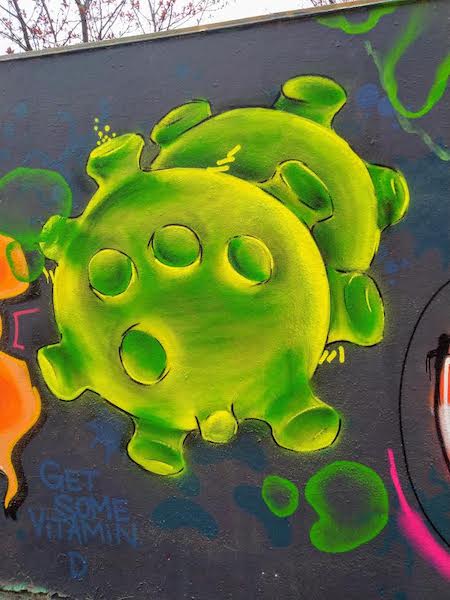
We still had a few hours to “enjoy” Copenhagen in the best possible way. Then we went to the famous Freetown Christiania, where we found a Coronavirus graffiti on a wall. Copenhagen looked like a ghost town: very few people on the streets, most shops were closed, no one enjoying a cup of coffee or sipping a pint.
At the train station, the feeling of the impending apocalypse was getting bigger and bigger, as almost all the trains to the airport had been canceled. And to ensure that passengers were sitting far from each other, it was necessary to reserve a seat on the train, which is not usually the protocol. Masks, gloves, handkerchiefs, hand sanitizers: each one boasting of their arsenal to survive the journey. Oh, and Heaven forbid sneezing or coughing: people would look at you as if you were Pandora’s Box itself. The safest thing to do was to swallow your rhinitis and do not choke on a cracker crumb: it could get ugly for you …. people were scared, very scared.
And I have to confess that I got carried away: I was freaking out, too. At the Copenhagen airport, the scenario was the same. The boarding process was so stressful that I do not even want to describe it. And again, an airline crew member was touching the railings, then her face, the pen … autopilot mode: on. Being fully attentive as much as possible? Difficult task.
EVERYTHING CHANGED IN ONE WEEKEND
Returning to Eindhoven, we found a city very different from the one we had left. In essence, the government had finally decided to take more severe measures, such as closing schools and restaurants. We have been at home since then, even though spring is calling outside. Several friends and acquaintances showing symptoms. An Argentinian friend had a crack in her rib due to excessive coughing … all that between Friday and Sunday.
The epigraph that opens this text transcribes a dialogue between my husband and me on Sunday morning. In 2012, we traveled to Cairo with a group of friends. We did not believe the rumors of instability in the country were to be taken so seriously.
It is still my favorite memory of a trip: contemplating the Pyramids. I saw myself smaller than a grain of sand. It was so humbling and beautiful. However, what we saw on the way back was surreal. The fear we felt was so great that it made me swear never to return to Egypt by land. By the way, two weeks after we had returned, the famed election happened, and all just went down the hill. We heard about groups of tourists, just like ours, being killed on the roads.
I was sure that we had learned our lesson, but apparently, we had not. On the other hand, I still do not know what we did learn this time. To pay attention to all the news and freak out? To believe in the atrocities we hear and see on social media?
Besides, compared to 2012, the amount of data we receive today is an avalanche: TV, social networks, messaging apps, websites, newspapers: everything and everyone covering us with fear, over and over. If you were to ask me what else is going on in the world, I would not know the answer.
The question is: where and how to find balance?
I mean it: I do not know at this point. What I do know is that the Coronavirus situation is really serious. And although I feel naive, maybe even a little stupid, for exposing myself and other people, to become aware of what is really happening, at this moment, I am just grateful for being able to be at home and for being healthy. And I am going to take advantage of the almost forced quarantine here in The Netherlands to think about it a lot.
Amid all this insane panorama, a simple scene warmed my heart and helped me remember to breathe: an old lady offering drops of alcohol gel to another elderly woman in a supermarket in Copenhagen, a few meters in front of us. They probably exchanged sweet and beautifully mundane words that my nonexistent Danish could never catch. But when I saw their smile to one another, I understood that humankind is still ONEkind.
In Brazilian Portuguese, we have a slang, which is also a famous hashtag: #tamo junto. It translates roughly to “we’re together.” Even though they have probably never heard the expression, those women truly know what this means.
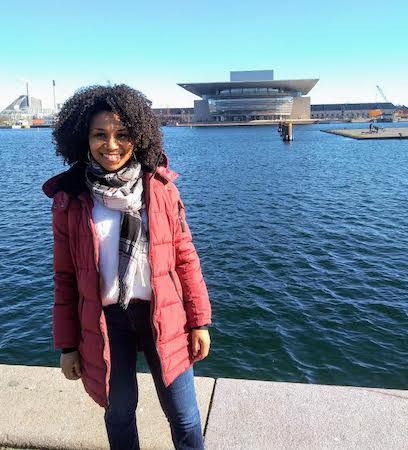
About the author:
Letícia Batista was born in Porto Alegre, south Brazil. She is a content creator with a Master’s Degree in Literary Studies. Her thesis was on avant-garde movements and Brazilian music, which she is most passionate about.
She has the best memories from Israel, where she lived from 2012 to 2014. Currently living in The Netherlands, more precisely in Eindhoven, she is once again enjoying the ease of traveling around, always accompanied by “the most beautiful and peaceful pair of green eyes I have ever,” as she describes her husband.
A curly fanatic, enthusiastic dancer and devoted home baker, Leticia’s motto is “everyone’s life is material for an incredible movie or a great book.” She loves to tell a story and, therefore, writes whenever she can.


